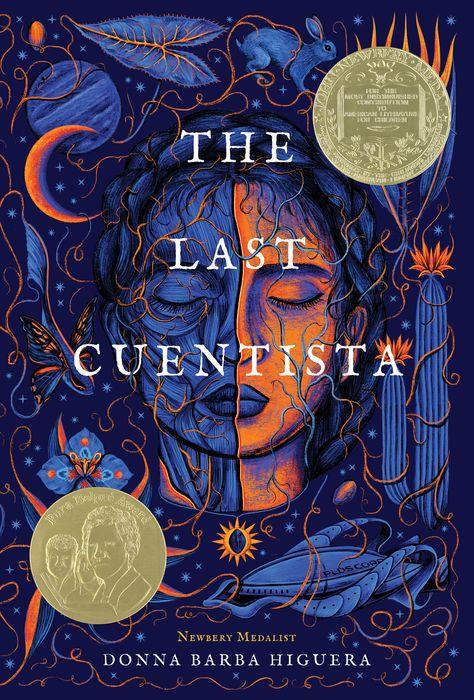The Last Cuentista, winner of this year’s Newbery medal is thought-provoking but leaves other thoughts unexplored.
The Last Cuentista by Donna Barba Higuera. Levine Querido (Scholastic), 2021, 314 pages

Reading Level: Middle Grades, ages 10-12
Recommended for: ages 10-15
The Final Frontier?
Petra Peña is saying good-bye to her grandmother, Lita. They both know it’s good-bye; a comet is speeding towards earth and all human life that remains will be extinguished. But a few will escape via space transport to Sagan, a terraformed planet meant to be their new home. Petra’s parents, whose expertise in botany and geology will be needed, are selected for transport. All has been carefully planned. During the journey, which will take centuries, the parents’ accumulated knowledge will be downloaded into the brains of Petra and her brother Javier as the family sleeps in hypersuspension. Once they’ve arrived, the second-generation Peñas will already be equipped to carry on the work necessary for the colony’s survival.
Petra doesn’t want to be a geologist or a botanist—she wants to be a cuentista, or storyteller, like her beloved Lita. Upon awaking in the transport, however, it doesn’t matter what she wants. Plans have gone horribly wrong. Her parents have been terminated, and probably her brother too. The human-like beings who occupy the ship are a Collective ruled by a cold and ruthless Chancellor. They have arrived at planet Sagan, but before they disembark the few surviving humans (all children) must test it for possible harm. Petra is now Zeta-1, a tool of the Collective. Her expeditions to the surface are for the common good, and when she’s no longer useful, so will be her termination.
What’s a Story Worth?
With echoes of The Giver, Brave New World, and A Wrinkle in Time, The Last Cuentista stakes out its own territory. Like those books, it wrestles with big questions. In order to abolish conflict and want, the Collective has also eliminated what makes us human: our stories and traditions. Petra instinctively rebels: “by honoring our past, our cultures, our ancestors—and remembering our mistakes—we become better.” By eliminating those things, we become less. We could even, as Petra’s father feared, become evil.
What stories matter, though? Not important: “All stories have value. Readers and listeners should decide whether stories speak to them or not.” Lita’s stories were drawn mainly from Mexican tradition, and as that it Petra’s heritage she feels a natural affinity. Lita’s Catholicism is a bit more fraught, offering Petra some comfort but no conclusions. She wonders whether “the whole Jesus thing” works so far outside her own solar system. Does God rule this part of the universe? Maybe not. When trying to pray, Petra hears nothing from God, “And I have nothing to say to Her right now anyway.”
The novel raises thought-provoking questions, and fiction isn’t designed to provide answers. But it can, sometimes, point in the right direction. The Last Cuentista points in the same general direction as “whatever works for you.” Pick the story that accords with your truth and heritage, it seems to suggest. But only one story, we believe, is objectively true.
Overall Rating: 4 (out of 5)
- Worldview/moral value: 3.5
- Artistic/literary value: 4.5
Read more about our ratings here.
Awards: Winner, Newbery Medal, Winner, Pura Belpre Award
Also at Redeemed Reader:
- Reflections: See our thoughts about classic sci-fi/dystopian fiction: The Giver, A Wrinkle in Time, and Ender’s Game.
- Review: Another space colony story from last year: The Lion of Mars.
We are participants in the Amazon LLC affiliate program; purchases you make through affiliate links like the one below may earn us a commission. Read more here.
Support our writers and help keep Redeemed Reader ad-free by joining the Redeemed Reader Fellowship.
Stay Up to Date!
Get the information you need to make wise choices about books for your children and teens.
Our weekly newsletter includes our latest reviews, related links from around the web, a featured book list, book trivia, and more. We never sell your information. You may unsubscribe at any time.
We'd love to hear from you!
Our comments are now limited to our members (both Silver and Golden Key). Members, you just need to log in with your normal log-in credentials!
Not a member yet? You can join the Silver Key ($2.99/month) for a free 2-week trial. Cancel at any time. Find out more about membership here.
2 Comments
Leave a Comment
You must be logged in to post a comment.


I have a bit of a challenge for Redeemed Reader if I can say that without sounding rude. If stories about stories are shallow and self-congratulatory (and there’s certainly a good case to be made that they are), what would you recommend authors who want to write about stories do instead? After all, authors want to write about what they’re passionate about and, not surprisingly, a lot of them are passionate about stories. How should they burn off that steam?
Cody,
I make no recommendations; authors can write what they want. The trend of seeing stories as an end rather than a means to something greater seems to me a symptom of a rootless age that has lost, or is rapidly losing, its sense of the transcendental. Our stories are no longer about anything outside ourselves but rather in ourselves.